Table of Contents
Epoxy flooring is a popular choice for both residential and commercial spaces due to its durability, resistance to chemicals and stains, and aesthetic appeal.
We explore the different types of epoxy flooring, installation process, benefits, potential drawbacks, maintenance tips, and suitability for residential and commercial settings.
Additionally, we discuss alternative flooring options for those seeking alternatives to epoxy flooring.
If you're curious about epoxy flooring and want to learn more, keep reading!
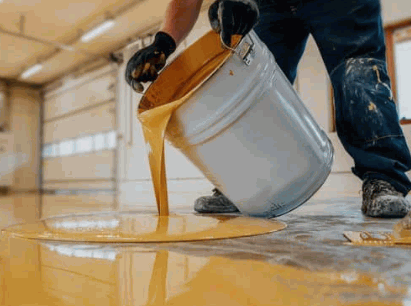
Check out: Can You Put Epoxy Flooring On Plywood
Epoxy flooring is a type of high-performance industrial flooring that provides a durable surface through the application of epoxy resin. It is a popular choice for various industrial sites due to its seamless surface and protective properties.
Epoxy resin, a key component of epoxy flooring, is a thermosetting polymer that, when mixed with a hardener, creates a tough and resistant surface. The application process involves preparing the substrate, mixing the epoxy components, applying them evenly, and allowing them to cure into a tough coating. Industrial flooring benefits from epoxy due to its resistance to chemicals, abrasion, and impact, making it ideal for high-traffic areas. Epoxy floors are easy to clean and maintain, contributing to their longevity and overall cost-effectiveness.
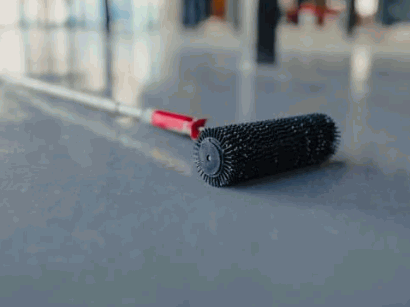
Epoxy flooring comes in various types, such as self-leveling epoxy floors, epoxy mortar floors, epoxy flake floors, and metallic epoxy floors, each offering unique characteristics and benefits.
Self-leveling epoxy floors are perfect for spaces that require a smooth, seamless surface, like garages or industrial settings. This type of epoxy spreads evenly on the floor, creating a leveled finish without the need for troweling. Epoxy flake floors, on the other hand, add a decorative touch with the incorporation of colored acrylic flakes. These flakes not only enhance aesthetics but also provide texture for added slip resistance.
Each type of epoxy flooring serves a distinct purpose, catering to different needs and design preferences.
Self-leveling epoxy floors are a popular choice for creating a seamless surface, providing a smooth and uniform finish to the flooring. Manufacturers like Flowcrete offer innovative self-leveling products for epoxy flooring solutions.
The benefits of self-leveling epoxy floors extend beyond just aesthetics. They are highly durable and resistant to chemicals, making them ideal for industrial settings where spills and heavy foot traffic are common. Self-leveling epoxy floors are easy to clean and maintain, reducing overall maintenance costs.
During the installation process, the self-leveling epoxy is poured onto the floor and spread out evenly to create a flat surface. This eliminates the need for extensive manual leveling, saving time and labor costs. Once cured, the floor provides a seamless finish that is not only visually appealing but also enhances the overall safety and functionality of the space.
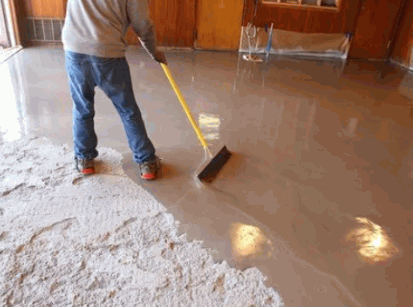
Epoxy mortar floors are designed to withstand chemical spills and provide a durable surface for industrial environments. The application of epoxy coatings enhances their protective properties.
One of the key benefits of epoxy mortar floors is their resistance to chemical spills, which makes them an ideal flooring solution for factories, warehouses, and other industrial settings where potential spillage is a concern. The seamless nature of epoxy coatings not only strengthens the base floor but also creates a unified surface that is easy to clean and maintain.
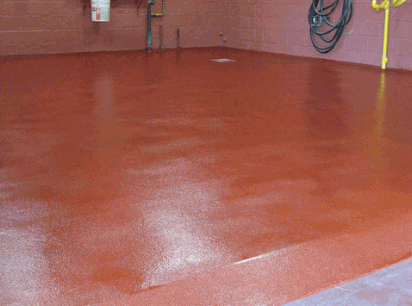
Epoxy flake floors are decorative flooring options that incorporate epoxy resin and flake coatings to create visually appealing surfaces.
These floors are not only visually stunning but also highly durable, making them a popular choice for residential and commercial spaces alike. The epoxy flake coating adds depth and texture to the surface, providing a unique aesthetic that can mimic the look of granite or terrazzo.
Along with their beauty, epoxy flake floors are also easy to maintain, requiring simple cleaning with a mop and mild detergent. This low-maintenance feature is ideal for busy environments where upkeep needs to be efficient and practical.
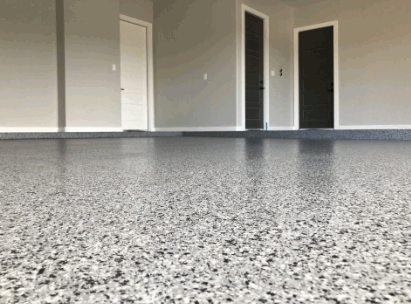
Metallic epoxy floors utilize metallic epoxy coatings to create a unique, high-gloss finish that offers both aesthetic appeal and practical benefits. Anti-slip additives can be incorporated to enhance safety.
One of the key advantages of metallic epoxy floors is their incredible versatility. These floors can be customized to create stunning, one-of-a-kind designs that mimic the look of marble, lava, or even waves in the ocean. The shimmering metallic pigments in the epoxy coating catch and reflect light, adding depth and dimension to any space. The seamless nature of metallic epoxy floors makes them easy to clean and maintain, perfect for high-traffic areas in both residential and commercial settings. The incorporation of anti-slip additives ensures that these visually striking floors remain safe and slip-resistant.
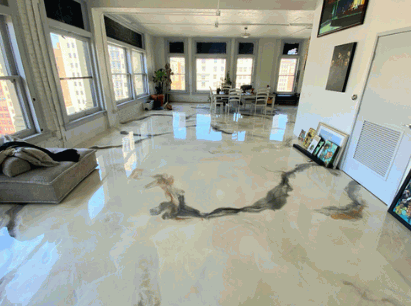
The installation of epoxy flooring typically involves preparing the substrate, applying an epoxy primer, mixing and applying the epoxy resin, and finally coating the floor with the desired epoxy finish.
It is crucial to ensure that the substrate is clean and free from any debris or contaminants. This can be achieved by thoroughly cleaning the surface and repairing any cracks or imperfections.
Surface preparation is key to a successful epoxy flooring installation. Next, applying an epoxy primer acts as a bonding agent between the substrate and the resin, ensuring a strong adhesion.
Resin mixing should be done carefully following the manufacturer's instructions to achieve the desired consistency. The final step involves applying the epoxy finish in even coats to achieve a smooth and durable flooring surface.
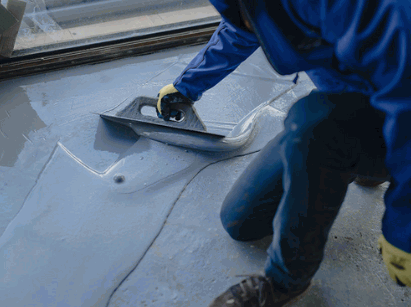
Epoxy flooring offers a multitude of benefits, including exceptional durability and resistance to chemical spills, easy maintenance requirements, and an aesthetic appeal that enhances the overall look of the space.
One of the remarkable advantages of epoxy flooring is its ability to withstand heavy traffic and impact without deteriorating, making it an ideal choice for industrial settings like warehouses or manufacturing facilities. Its seamless surface prevents dust accumulation, ensuring a cleaner and more hygienic environment. Epoxy coatings can be customized to incorporate various colors, patterns, and finishes, allowing for a personalized touch that suits different design preferences.
One of the key benefits of epoxy flooring is its exceptional durability and longevity, providing long-term protection to the underlying concrete floors in industrial and commercial settings.
Due to its seamless application and chemical resistance, epoxy flooring can withstand heavy foot traffic, impacts from machinery, and harsh chemicals, making it a reliable choice for high-traffic areas. This enhanced durability helps to maintain the structural integrity of the floors, preventing cracks, stains, and damage over time.
The long lifespan of epoxy flooring reduces the need for frequent repairs or replacements, resulting in significant cost savings in the long run. This cost-effectiveness, combined with its ability to resist wear and tear, makes epoxy flooring a practical investment for businesses looking to ensure the longevity of their floors.
Epoxy flooring showcases excellent resistance to chemicals and stains, making it ideal for environments prone to spills and requiring a seamless surface for easy cleanup and maintenance.
Through its chemical and stain resistance properties, epoxy flooring provides a durable shield against potential damage caused by spills and leaks. The seamless nature of epoxy application ensures that liquids cannot seep through gaps or cracks in the flooring, maintaining a protective barrier against corrosive substances. This feature is particularly beneficial in industrial settings where chemical spills are a common occurrence, as epoxy flooring acts as a safeguard, preventing hazardous materials from penetrating the underlying surface.
Epoxy flooring is known for its easy maintenance requirements, with simple cleaning procedures and the availability of creative maintenance solutions that help preserve its appearance and performance.
One key aspect of maintaining epoxy flooring is regular cleaning to remove dirt and debris that can accumulate over time. Sweeping or vacuuming the floor frequently can prevent scratches and extend its lifespan. Regarding spills or stains, a gentle cleaning solution with water and mild soap is usually sufficient to keep the flooring looking its best.
Along with routine cleaning, applying a protective sealant periodically can enhance the durability of the epoxy surface and provide an extra layer of protection against wear and tear. This maintenance step can help guard against moisture damage, chemical spills, and other common hazards that might compromise the integrity of the flooring.
For more advanced maintenance needs, innovative solutions like self-healing coatings are gaining popularity in the industry. These coatings have the ability to repair minor scratches or surface imperfections on their own, reducing the need for frequent touch-ups and professional interventions. By incorporating such cutting-edge maintenance technologies, epoxy flooring can maintain its sleek finish with minimal effort from the owners.
Beyond its functional benefits, epoxy flooring offers an aesthetic appeal that can transform spaces, with options like epoxy terrazzo flooring and resin flooring providing unique design possibilities.
For those looking to create a modern and sleek look, epoxy flooring comes in a variety of colors and finishes, allowing for creative expression and personalization. Epoxy terrazzo, for example, combines colored aggregates with epoxy resins to produce a stunning, seamless surface that mimics the look of traditional terrazzo but with added durability.
Resin flooring offers a glossy, high-end finish that can resemble polished concrete or even luxurious marble at a fraction of the cost. The ability to incorporate patterns, textures, and even 3D effects into epoxy floors opens up a world of design possibilities for residential, commercial, and industrial spaces alike.
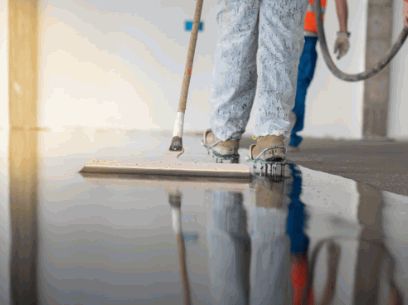
While epoxy flooring offers numerous benefits, potential drawbacks include the initial cost of installation, concerns about surface slipperiness, and the time-consuming nature of the installation process.
When considering the cost, epoxy flooring can be more expensive initially compared to other flooring options. The materials required for epoxy flooring can be pricey, and professional installation costs add to the overall expense. The risk of surface slipperiness is a common concern, especially in areas prone to moisture or frequent spills.
The installation process for epoxy flooring can be time-consuming. It involves multiple steps such as surface preparation, applying the epoxy coating, and curing time, which can prolong the overall timeline for completion.
The initial cost of epoxy flooring installation can vary based on the type of epoxy floors chosen, though the long-term durability and cost-effective maintenance often offset the upfront investment.
One of the critical factors influencing the initial cost of epoxy flooring is the type of epoxy used. There are various options available, such as solvent-based, water-based, and 100% solid epoxy, each with different costs and performance characteristics.
Comparing these types can help determine the best fit for the budget and the intended use of the space. The quality and thickness of the epoxy coating play a significant role in the overall expense. Opting for a thicker coating may increase the initial cost but enhance the durability and longevity of the flooring, making it a cost-efficient choice in the long run.
Concerns about a slippery surface with epoxy flooring can be addressed by utilizing antistatic epoxy flooring options or incorporating anti-slip additives during installation to enhance traction and safety.
Slippery surfaces pose a significant risk, especially in high-traffic areas or industrial settings where accidents can lead to serious injuries. Utilizing antistatic options can help reduce the static charge build-up, enhancing safety further. Incorporating anti-slip additives, like granules or grit, into the epoxy coating adds grip and improves traction, minimizing the chances of slips and falls. These measures not only prioritize safety but also enhance the durability and longevity of the flooring, making it a wise investment in the long run.
The installation of epoxy flooring can be time-consuming, especially when multiple coats and epoxy primer formulas are required, but the protective benefits and longevity of the finished surface justify the installation time.
When opting for epoxy flooring, one must understand the dedication involved in the process, starting with the meticulous application of primers to ensure a strong base for the epoxy coating. The use of specialized coatings not only enhances the durability of the floor but also adds a layer of protection against heavy foot traffic, stains, and spills.
While the initial installation may demand patience and precision, the payoff comes in the form of an incredibly resilient surface that can withstand years of wear and tear, making it a cost-effective choice in the long run.
Maintaining epoxy flooring involves regular cleaning with mild solutions, avoiding harsh chemicals that can damage the surface. Utilizing creative maintenance solutions tailored to epoxy floors, like those designed for epoxy mortar flooring, can help preserve the flooring's integrity.
Regularly sweeping or vacuuming debris on epoxy flooring is essential to prevent scratches and maintain its shine. Along with routine cleaning, consider placing protective mats at entrances to reduce dirt and moisture buildup. Spills should be promptly wiped up to prevent staining. Opt for pH-neutral cleaners for gentle yet effective maintenance. Avoid abrasive tools that can scratch the surface.
Applying a high-quality topcoat every few years can enhance the durability and appearance of epoxy floors. Consult with professionals for specialized care tips, such as addressing any cracks or chips promptly. By following these maintenance practices, your epoxy flooring can stay vibrant and resilient for years to come.
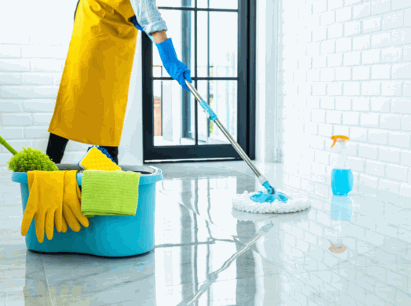
Epoxy flooring is versatile and suitable for various settings, including both residential and commercial environments.
One of the key advantages of epoxy flooring is its durability and resistance to stains, chemicals, and heavy foot traffic, making it ideal for high-traffic areas like kitchens, warehouses, and retail spaces. In residential settings, epoxy floors provide a sleek and modern look that can enhance the overall aesthetic appeal of a home. The seamless surface of epoxy flooring makes it easy to clean and maintain, reducing the long-term costs associated with upkeep.
While epoxy flooring is popular, alternative options like synthetic resin flooring or epoxy glue systems offer different solutions for industrial flooring needs, providing a range of choices beyond traditional epoxy floors.
Synthetic resin flooring, known for its exceptional durability and chemical resistance, is ideal for high-traffic areas in industrial settings. It offers a seamless finish that can withstand heavy equipment and frequent cleaning without wear and tear. On the other hand, epoxy glue systems provide a versatile solution that can be customized with various additives to enhance strength, slip resistance, or aesthetics.
Both synthetic resin flooring and epoxy glue systems are highly versatile, making them suitable for applications in warehouses, manufacturing plants, healthcare facilities, and more. Depending on the specific requirements of the space, one can choose between the two options to achieve the desired balance of performance and aesthetics.